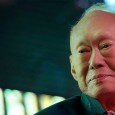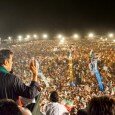By Maria Tirmizi –
A participant of Pakistani politics now settled in the U.S. makes sense of the 2013 Elections. The 2013 elections in Pakistan were not about a new beginning for me. As someone who had participated enthusiastically in the 2002 and 2008 elections, I didn’t need much convincing about the benefits of voting.
But with Facebook and Twitter my only connection with what was really happening in Pakistan, I was being convinced that something new was happening, some sort of revolutionary change. Only this time, I was thousands of miles away.
We all know what followed. The information that I was being inundated with on social media represented only one very thin slice of Pakistani society. A large chunk that was not on Facebook also had some pretty strong opinions.
Of course, the scenario is much more complicated than that. And that is precisely what we must appreciate. It is never black and white, and never will be.
As rational observers, we cannot deny that elements of change did occur. A party that had no representation in the parliament is now set to lead an entire province. Young people who threw around the word ‘politician’ as a curse are now leading their public and social media campaigns, defending the integrity of their chosen candidates.
Political groups who have held an entire city hostage for decades are being openly challenged by young, urban and educated people who are shocked at the denial of their basic right to vote.
But change is not an overnight phenomenon. It occurs over a very long period of time. Even with revolutions that are bloody, society never really changes overnight. Old social structures resist, new ones emerge, and others go through slight shifts. Only with hindsight can one evaluate which way the struggle went.
When I would speak to someone back home who was aware of what was happening in our small towns, districts and villages, the picture would become a lot murkier. It is here that people already knew how to vote. They had been doing it for years. Some of them had reaped personal benefits from supporting a candidate — a job for a son who had no business looking for work when most of his competitors had been to expensive private schools, or a better road leading to his village. So when his candidate switches his party, why should he not switch his election symbol? After all, no-one else had ever done anything for him.
Others, of course, demand more. Why should I be okay with this patronizing, menial government job, the son may ask. Why can better education not be accessible to me so that I can make my own future better? Whether it is increasing urbanization or exposure to media, young people are openly challenging their loyalist fathers.
Between the new revolutionaries and the diehard loyalists, there were those who were conflicted. They liked one party, but preferred the candidate of another in their constituency. The secular views of one party resonated the most with some, but its disastrous governance record put them off. They admired the personal commitment of one leader, but the level of experience of another.
Frankly, for those outside an absolutist position, things were a little messy. For those of us following the elections from far away, it didn’t really matter where we were. We felt as much a part of the process.
I remember a professor once asked during a class discussion why location matters so much. He found it curious how an opinion emanating from the West is automatically assumed superior. Vice versa, there are those who hold people in the West accountable for their location, criticizing their opinions for not being tied to day-to-day living.
The reality is not always simple. Wherever you go, you carry a part of yourself with you. You add layers on to it, perhaps becoming a more well-rounded person, but you can never be something totally else.
Many of us, who are not living in Pakistan at the moment, whether for studies or family, feel a renewed sense of attachment towards our country. You grow in love with it all over again. You romanticize about its weather (constant updates from those in Islamabad do not help), the places and the people. Your love and respect increases, knowing that no matter where you go, they will always be your people.
So being thousands of miles away and not being able to participate this time, it was only with pride that I followed these elections. Setting aside disappointments with some irregularities, I choose to see the glass half full. This is the first truly democratic transition that the country has ever experienced.
For the first time, foreign newspapers are talking about democracy in Pakistan, and not terrorism in Pakistan. For the first time ever, my Facebook newsfeed is brimming with passionate discussions about politics. The people who wanted to see change have taken the first step, by changing themselves. The result will eventually follow.
The writer is a Columbia School of Journalism grad based in New York.She has previously worked for The News and The Express Tribune































































































